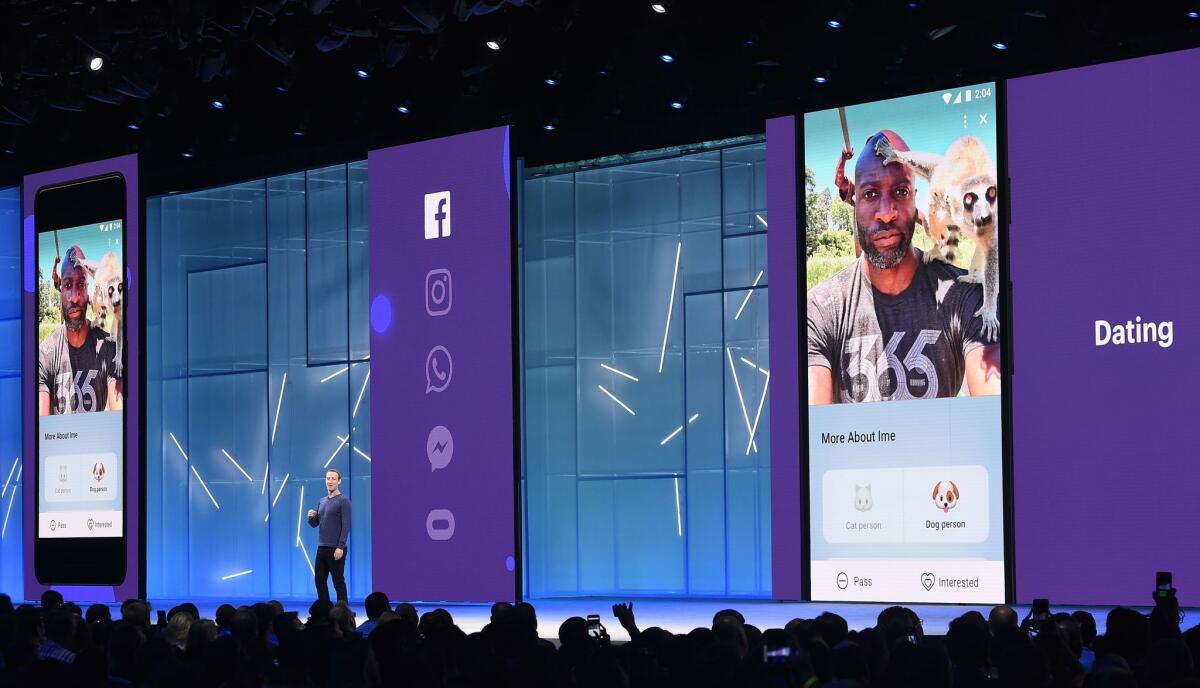Column: Why Facebook’s new features aren’t the upgrade we need

- Share via
Beware of technology moguls bearing gifts.
This is my message to you now that I have browsed through the collection of new features Facebook CEO Mark Zuckerberg unveiled at the company’s annual F8 developer conference on Tuesday.
Like the posts on your Facebook News Feed, the F8 goodies are a mix of cool gizmos (An Oculus Go virtual-reality headset for $199!); uplifting updates (Instagram is getting anti-bullying features!); and stuff that sounds kind of sketchy. We’ll get to that in a minute.
Coming in the wake of Facebook’s data-harvesting debacle and the presidential election fake news fracas, F8 would have been a good time for Zuckerberg to reassure the world that the social-media behemoth is doing everything in its massive power to keep users’ data safe and our News Feeds free of fakery.
Instead, the message being sent by all these new bells and whistles was only marginally about addressing the marauding elephant in the room. It was more along the lines of, “Been there. Talked about that. Moving on.”
Let’s start with the sketchy stuff, shall we?
In an attempt to compete with OKCupid, Tinder and other dating apps, Facebook will be launching FaceDate, a free app that will match you with other Facebook users based on the data it has collected about you. Let’s just think about that for a minute.
A dating app rooted in the community that also includes your mom, your nieces and nephews, your friend who has definitely gone over to the political dark side and one or more exes. A dating app making its recommendations based on comments you made while hate-watching “The Bachelor” and the emojis you fired off while waiting in line at Donut Bar.
A dating app that would allow an invasive social-media giant that has already played fast-and-loose with your data to now be intimately involved in your love life.
That’s not terrifying at all!
Speaking of not terrifying, let’s take a gander at how Facebook is planning to tackle the very real problem of fake news.
In a meeting with media executives on Tuesday, Zuckerberg said that Facebook plans to spend “billions and billions of dollars” to combat fake news, misinformation and hate speech. Zuckerberg also said that the company has launched a system of ranking news organizations based on a trustworthy index determined by … Facebook users.
Which means that in Facebook’s battle against fake news, one line of defense includes the people who were fooled by fake news in the first place. Also people who are not actually people but fake Facebook accounts created by Russian trolls, click-bait companies and perhaps a Nigerian prince who has some lottery winnings he would like to share with you.
When you crowd-source your gate-keeping, you get exactly the kind of echo-chamber effect Zuckerberg says Facebook is trying to avoid. People promote the ideas and sources that reflect their views. That is how fake news spreads. A troll tells a user what they want to hear, and then that user tells a few friends, and those friends tell their friends, and voila! Democracy is in the spam filter.
That’s not upgrading. It’s enabling.
In more promising news, Zuckerberg said Facebook will be adding a “Clear History” feature, which is supposed to give you the option of erasing the information about the apps and websites you have interacted with while on Facebook.
He did not say how this would work, exactly. But if clearing your history is anything like the elaborate hoop-jumping process of downloading a copy of your Facebook data — which experts suggest you encrypt, just to be safe — I’m not sure how many of us will actually do it. Offering a security feature that is a pain to implement allows Facebook to give lip service to protecting users without actually giving up much.
Not that I’m skeptical or anything.
In its unsettling new TV ad campaign, Facebook attempts to clear its recent history by asking us to return to the good old days, when Facebook was just a way to connect with old friends and not a stealth agent for various evil empires.
But it’s too late for that.
Now that we know what’s behind the curtain, the best option for people who still want to use Facebook is to treat it less like a friend and more like a frenemy. Laugh at its jokes. Coo at its baby pictures. But take everything it tells you with a heaping pile of salt and a quick peek at FactCheck.org. Don’t tell it anything you’d rather the world and the world’s advertisers didn’t hear.
And whatever you do, don’t let your Facebook frenemy set you up on a date. There aren’t enough sad-face emojis in the world for that.
Twitter: @karla_peterson
More to Read
Sign up for Essential California
The most important California stories and recommendations in your inbox every morning.
You may occasionally receive promotional content from the Los Angeles Times.











